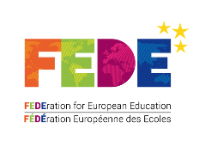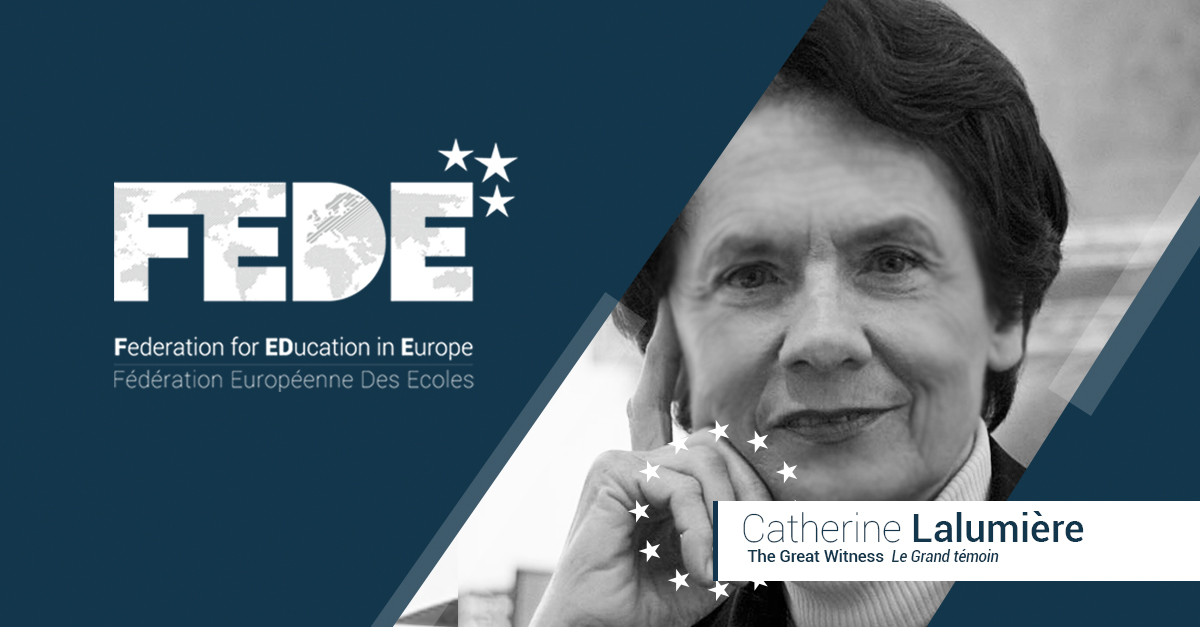 The Great Witness
The Great Witness
Regularly, via its site, the FEDE will offer you the opportunity to meet up with a person who holds, or has held, a particularly important role in the world of teaching, education, training or the construction of Europe.
Catherine Lalumière : “More than ever we need Europe”.
Catherine Lalumière has been a minister and elected member of parliament on several occasions; she has held the posts of general secretary of the European Council, and has been vice-president of the European Parliament. Currently she is president of the Maison de l’Europe de Paris (House of Europe of Paris) as well as La Fédération française des maisons de l’europe (The French Federation of the Houses of Europe, le Relais Culture Europe (The European Creative Office) and finally president of the European Association of the Schools of Political studies of the European Council.
In the interview below she answers our questions.
In an article, published in the revue, “Après demain” (After tomorrow) (“Education for citizens… European ones ”) (1)( See below) you have written “In a country like France, for example, who knows whether they are a European citizen; who knows what are their rights and their responsibilities?” Would you ask the same question today?
Unfortunately, yes. Since making this sad observation in 2013, the situation hasn’t changed. It is rare that one finds people in France, and undoubtedly in other European countries, who know that they are European citizens, and that this status gives them rights, but also responsibilities. Citizenship remains an unknown. In the same way, the feeling of belonging to a community with shared European values is hardly felt at all. As a matter of fact, people who fully know these rights are rare; people who fully know these responsibilities are rare, as are people who fully know these values.
What are you proposing in order to reinforce this knowledge of the aforementioned rights?
In reality, the knowledge of these rights, responsibilities and values is a priority. Thus, it’s all about the knowledge of them! Everyone needs to get involved; families educating their children, cultural or social associations, associations with a particular responsibility for knowing about the construction of Europe etc. However, the most important player involved in transmitting the knowledge of citizenship remains the school, School with a capital S. Being able to shape citizens (both national and European) is the responsibility of both teaching and educational establishments. To do it well, it is indispensable that there are classes in citizenship running alongside, and feeding into comments that could be made during other subject classes (history, languages etc.)
Generally speaking, aren’t all the affairs of Europe suffering from this lack of knowledge?
You are right. Today still, the real questions about Europe are poorly known. Of course, it’s true that these questions are often complex and not everyone is able to have access to them but we should be making an effort in teaching to select and communicate knowledge about Europe that is essential, especially that which will enable people to understand the meaning of the European project and why this project was undertaken post 1945, and why, in the 21st century we need Europe more than ever.
Isn’t it more important to underline the value of the European construction in this time of globalisation rather than to underline a more abstract knowledge of questions concerning Europe?
I’ve already answered your question somewhat. Of course, the European institutions intervene in many areas, take numerous decisions and, it is impossible to know and to master everything, but together, the public, citizens, must know and understand that which is essential. In my answer above I highlighted the European project itself, in order to be able then going on to reply to reply to the question “Why have we undertaken this great adventure?” but to this I would add that we must understand that this project isn’t just an economic one (A huge common market, a shared currency…) but it is also a spiritual and cultural one. The project rests on values and a particular understanding of man in society. The European project is not a neutral one but one that rests on choices that one either approves of, or not. In this way, one can approve of, even warmly approve of, the humanist and democratic values, but at the same time, distance oneself from the economic choices considered to be too liberal. But, for this to happen, there is a necessary implication; that the citizens of Europe are both trained and informed in order to be able to assess and form a critique being in full knowledge of the facts.
When all is said and done, I remain optimistic. I am convinced that we will be able to reconcile Europe with its citizens. A recent example that made me really happy, took place in Rumania. I knew this country following the fall of the Berlin wall and the death of the Rumanian dictator Ceausescu. The very first steps taken towards democracy were slowed down by the corruption that was spread throughout the political classes like gangrene. However, recently, the youth of the country have become active; enormous gatherings have taken place to protest against the scandal of corruption and to protest so that the values of Europe can finally be respected in their country. These young Rumanian protesters create a real sense of hope.
(1) “Apres demain”, is the trimestral revue of the Zeligman foundation. The revue was founded in 1957 by a group from the league for human rights and inspired initially by Françoise Zeligman. The purpose of the revue is to help those who are trying to understand the contemporary challenges and those responsible for explaining them (teachers, educators, politicians …)
Catherine Lalumière, Doctor of Law, and Lecturer at University conferences, has been president of the la Maison de l’Europe de Paris (House of Europe of Paris) since 2003, and since 2008, has been president of the la Fédération Française des Maisons de l’Europe (FFME)(The French Federation of the Houses of Europe) (FFME). She has also been vice president of the Mouvement européen international.(International European Movement) Her activities and involvement have focussed for many years on the construction of Europe.
Involved in politics as a deputy (Member of Parliament) for the Gironde department from 1981-1989, she became known nationally when she was entered the government formed by Mauroy in 1981 following the election of François Mitterand to the presidency. She briefly held office at the Ministère de la Fonction publique (Ministry of Education and Training) before being named to the Ministry of Consumer Affairs. It was in 1984 that her career took on a European dimension when she was chosen to be Secretary of state responsible for European affairs in the government of Laurent Fabius. Notedly, whilst in this post, she signed the Schengen Accords on behalf of France in 1985.
She left the government in 1986 and then became General Secretary of the European Council in 1989, a post that she held for five years. At the end of her mandate in 1994 she was elected to serve as a European member of parliament, and in this way, found herself back in the European Parliament. She was re-elected in 1999, and some two years later, in 2001, she was chosen for the role of vice president of the European Parliament until 2004.

